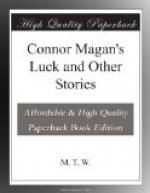Seventh-day afternoon was a holiday, and on one of these occasions I was sent to stay with my grandmother, as my mother, as my maiden aunt (the latter lived with my grandmother) were going to Polpis to a corn-pudding party. I was too troublesome to be left at home, therefore, two birds were to be killed with one stone.
Now I had for a long time desired to be left alone with my lame and deaf grandmother and the Tall Clock, especially the Tall Clock. I went, therefore, to her old house on Plover street in a calm and lovely frame of mind and helped get my aunt ready for the ride.
’Twas a cold day though September; and after she took her seat in the flag-chair tied into the cart, I conceived the notion to add my grandmother’s best “heppy” to the wraps which they had already put into the calash. I always had wanted a chance at that camphor-trunk; and the above cloak, too nice to be worn, lay in the bottom underneath a mighty weight of neatly-folded articles of winter raiment. It came out with a “long pull” and many a “strong pull” and I got to the door with the head of it, while the whole length of this precious bright coating was dragging on the floor. But the cart had started, and when my aunt looked back, I was flourishing this “heppy” to see the wind fill it.
I returned to the room, restored the article to the chest quite snugly, leaving one corner hanging out and that I stuffed in afterwards and jumped upon the cover of the trunk so that it shut. Very demurely I sat down before the open fire by my grandmother’s easy chair, rocking furiously, watching my own face in the bright andirons, whose convex surfaces reflected first a “small Nancy” far off, then as I rocked forward, a large and distorted figure. My rapid motions made such rapid caricatures that I remained absorbed and attentive. My grandmother, not seeing the cause of my content, decided (as she told my mother afterwards), “that the child was sick, or becoming regenerated.” Happy illusion!
At last, my grandmother got to nodding and I sprang to my long-contemplated work.
Putting a cricket into one of the best rush-bottom chairs, I climbed to the Clock; took off the frame glass and all, from its head, placing it noiselessly on the floor; opened the tall door in the body of the clock; drew out and unhung the pendulum—the striking weight, whose string was broken, was made all right and put for the time being on the table. Then the “moon and stars” which had been fixed for a quarter of a century, were made to spin; the “days of the month” refused to pass in review without a squeak that must be remedied, so I flew into the closet to get some sweet oil which was goose-grease; but shutting the closet-door I roused my grandmother.
I quietly went at the old rocking again, the bottle of goose-grease in my pocket, which I feared might melt and I should lose the material—the bottle was already low.




